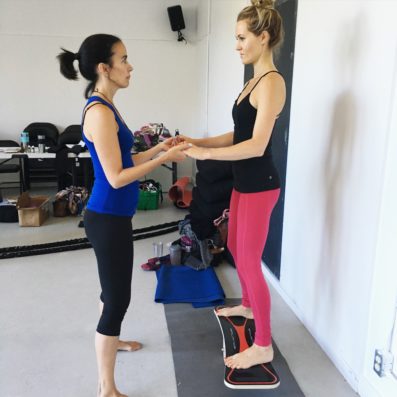Hi Jane. Thanks for being here and doing this. What has inspired your work as a trauma coach?
That is a complex answer. In short, I wanted to find a way to feel more healed and less broken from my own personal trauma history. I fought hard to explore ways that would help stop the broken record of my personal stories. I needed to put things in my life that would bring greater happiness, peace and a deeply felt sense of purpose that I was able to fulfill.
I also found that working in the safer space of my studio, Urbanfitt, that people’s bodies were asking for deeper healing far beyond just wanting to feel more fit. People’s spirits or highest selves were starving to be fed as well. I’ve worked with clients with a variety of traumatic stress and trauma histories and found some commonalities amongst them. Their bodies were reacting in similar ways, keeping them stuck in patterns of fear, reactivity, physical and emotional pain. I started voraciously researching connections, training in alternative therapies that respected the body’s role in impacting the brain and started naming the work I’ve been doing for many many years. Whenever I see common patterns amongst clients, I start looking for the research to confirm my observations. It’s important that our work with the body also stay grounded in science.

The word trauma seems really heavy and is even stigmatized for a lot of people. Can you define birth trauma for us?
I look at traumatic stress as falling on a spectrum. Many things about being a human being on this planet can feel like traumatic stress. Whenever what we have to face feels like it exceeds our ability to cope, we have come in contact with traumatic stress. Some people get far more than their fair share of traumatic stress and traumatic experiences. To think that trauma happens only to ‘other people’ does not allow us to sit with our difficult emotions authentically. Divorce, death, injuries, car accidents, job loss, life threatening illness, a very difficult birth or pregnancy can leave us feeling helpless and lacking in the ability to influence our circumstances. We can stay stuck in the memory of events, unable to leave them behind and fully engage with our present lives. We might feel that we could completely fall apart. I’ve also worked with survivors of sexual assault, child abuse or neglect, torture or war. It is unquestionable that we would view these people as having suffered from trauma. People often get stuck thinking that to have suffered from trauma, we have to be suffering with PTSD, but that’s so not the case. We can be carrying past trauma that shows up as chronic pain, sleeplessness, depression and anxiety among many other symptoms that aren’t black and white like a diagnosis of PTSD.
How are postpartum depression and birth trauma linked?
When we face traumatic experiences that leave us feeling out of control – including during medical procedures over which we had no choice – we can end up with residual impacts of trauma in the body. Some women who experience trauma during birth can be left feeling frozen, especially if we felt very fearful during a medical procedure that we had to remain completely still for, or if we were subjected to emergency c-sections, or feared for the safety of our baby. This frozen feeling can leave us almost paralyzed from intense fear, unable to move in order to keep ourselves safe. Further on the spectrum, our minds and bodies go into a state of collapse, literally playing dead in a primal response to fear so we look less attractive to a predator. These responses are all meant to ensure our survival, back when we were getting chased by tigers. Postpartum depression might be linked to a trauma response because when we feel a threat to our survival or the survival of those we love, our bodies will go to a very primitive nervous system response of playing dead, like a reptile does in order to not get eaten. This is a totally unconscious survival response that allows us to numb out and feel less should we actually experience our worst fears. Our body and brain are actually trying to protect us from physical and psychological pain by cutting ourselves off from fully experiencing what is happening in the moment. This response can also feel like anxiety in terms of the freeze response or depression in terms of the collapse response. But the issue is that if we aren’t working in a trauma informed health care system, we aren’t being given the tools and strategies to get out of these states that become stuck in our nervous systems and tissues. If mom and baby survive difficult births, we are left with feeling like we should be grateful but our bodies still feel like we are stuck in that intensely fearful state. This feeds shame about the birthing experience and poses many mental health challenges.
What advice would you give to any woman reading this feeling she may have experienced a traumatizing birth?
Become your own guru. Become your own rescuer and research the impact of trauma on the body. When you start to make sense to yourself, the weight of your experience can lift. Search for trauma informed movement professionals and therapists who completely understand the impact trauma has on the brain and body. There are more experts coming into the field of trauma informed healing and movement every day. Spend more time with people who ‘get it’, who validate your experience. Trust that you can tap into the brain and body’s ability to heal and change. You can tap into the experience of your trauma and use it to become even stronger than you were before by becoming your own health advocate.
